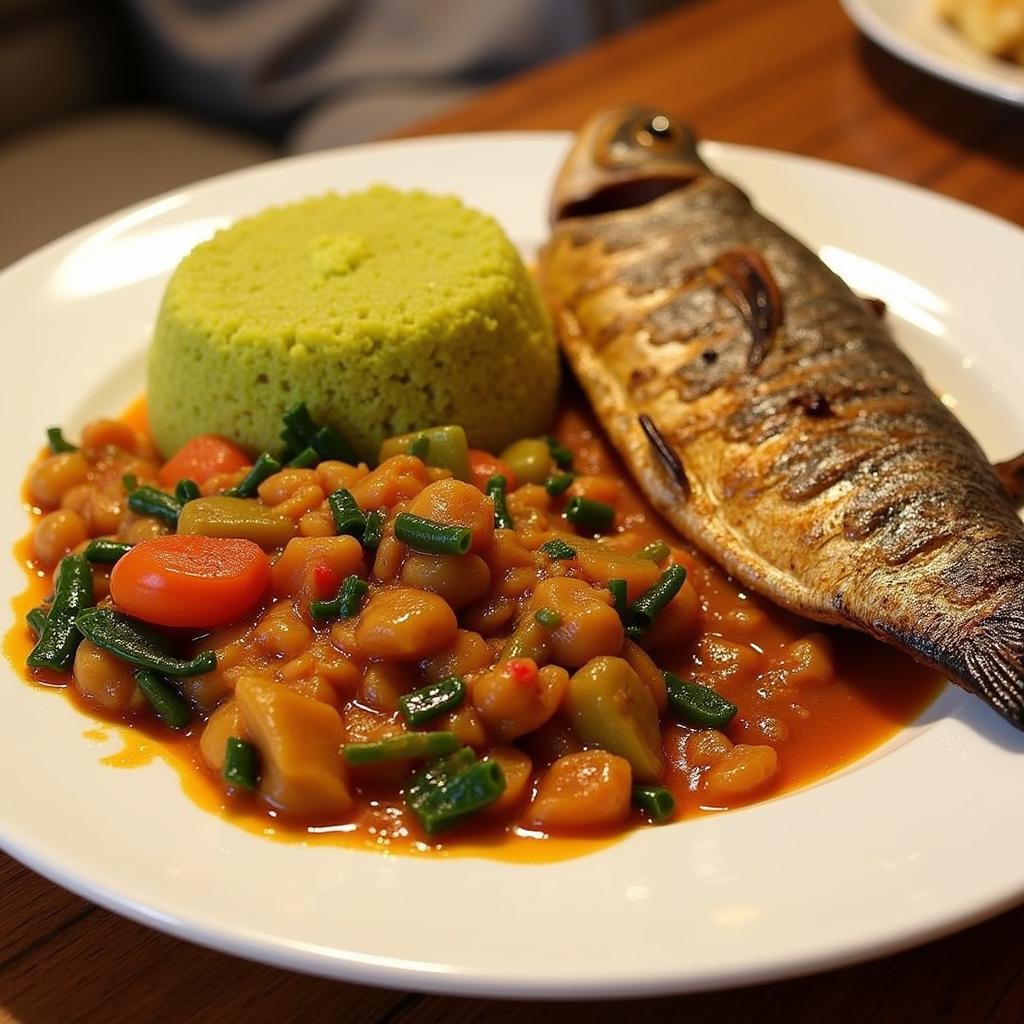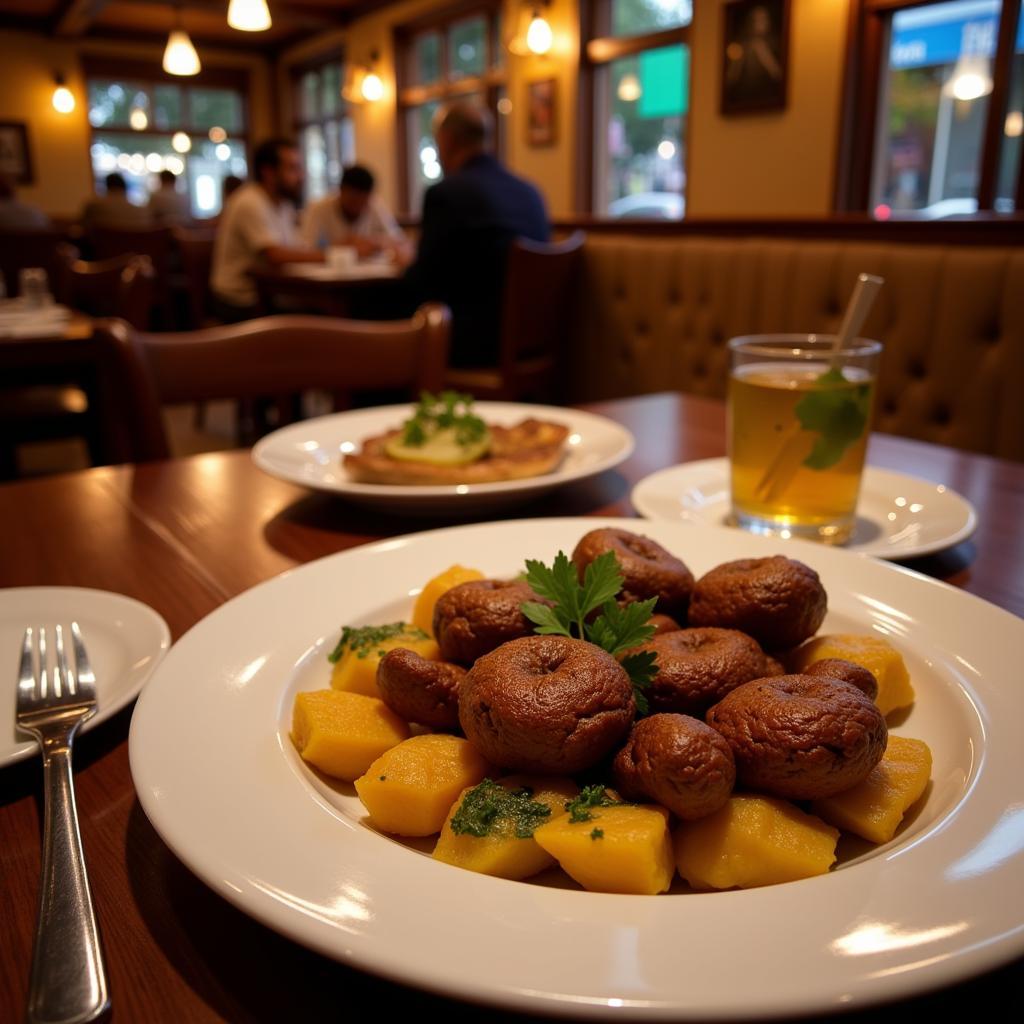Bobolo, a steamed cassava dish, is a beloved staple of African food, particularly in Cameroon. This culinary delight offers a unique taste and texture, making it a popular choice for both everyday meals and special occasions. From its humble origins to its versatile nature, bobolo offers a fascinating glimpse into the rich tapestry of African cuisine.
What is Bobolo African Food?
Bobolo, also known as miondo, is a traditional African food made from fermented cassava. The cassava root is peeled, grated, wrapped in leaves, and then steamed to perfection. The resulting dish has a slightly sour, yet pleasant flavor and a dense, chewy texture. It’s a versatile food that can be enjoyed for breakfast, lunch, or dinner, and is often paired with various sauces and accompaniments to create a truly satisfying meal.
The Origins and Cultural Significance of Bobolo
Bobolo has its roots in Central Africa, particularly in Cameroon, where it is considered a national dish. It’s deeply ingrained in the culture and is often served during festivals, celebrations, and family gatherings. The preparation of bobolo is often a communal activity, bringing families and friends together.
How to Enjoy Bobolo: A Guide to Pairings and Serving Suggestions
Bobolo’s subtle flavor profile makes it an excellent base for a variety of sauces and accompaniments. It’s commonly paired with Ndongue, a flavorful spinach stew, or with grilled fish or meat. Some also enjoy it with peanut sauce or a simple tomato-based sauce.
Exploring Different Bobolo Recipes
While the traditional method of preparing bobolo remains popular, there are various regional variations and modern adaptations. Some recipes incorporate spices and herbs to enhance the flavor, while others experiment with different steaming techniques.
 Bobolo Serving Suggestions with Ndongue and Grilled Fish
Bobolo Serving Suggestions with Ndongue and Grilled Fish
Why is Bobolo So Popular?
Beyond its delicious taste and cultural significance, bobolo offers several nutritional benefits. Cassava is a good source of carbohydrates, providing energy for the body. It is also relatively low in fat and cholesterol. However, it is important to note that cassava should be properly processed to remove naturally occurring toxins.
Is Bobolo Healthy?
While bobolo can be part of a healthy diet, it’s essential to consume it in moderation and as part of a balanced meal. Pairing it with protein and nutrient-rich sauces, like Ndongue, can enhance its nutritional value.
Where to Find Bobolo
If you’re eager to try bobolo, you can find it in African restaurants or specialty food stores. You can also try making it at home, although the process can be a bit time-consuming.
 Bobolo Served in an African Restaurant
Bobolo Served in an African Restaurant
Conclusion: Experience the Taste of Africa with Bobolo
Bobolo, a cornerstone of African food, offers a unique and delicious culinary experience. From its rich cultural history to its versatile nature, bobolo deserves a place on your culinary bucket list. So, whether you’re a seasoned foodie or simply curious about exploring new flavors, don’t hesitate to try this delightful dish.
FAQ
- What is bobolo made of? Bobolo is made from fermented cassava root.
- What does bobolo taste like? Bobolo has a slightly sour yet pleasant flavor and a dense, chewy texture.
- What is bobolo served with? Bobolo is typically served with Ndongue (spinach stew), grilled fish or meat, peanut sauce, or a tomato-based sauce.
- Is bobolo healthy? Bobolo can be part of a healthy diet when consumed in moderation and as part of a balanced meal.
- Where can I find bobolo? You can find bobolo in African restaurants, specialty food stores, or you can try making it at home.
- Is bobolo gluten-free? Yes, bobolo is naturally gluten-free.
- What is another name for bobolo? Bobolo is also known as miondo.
More on Mina Cones Food
- Explore more African recipes
- Learn about other cassava-based dishes
- Discover the diverse flavors of Cameroon cuisine
Need help? Contact us 24/7: Phone: 02437655121, Email: minacones@gmail.com or visit us at 3PGH+8R9, ĐT70A, thôn Trung, Bắc Từ Liêm, Hà Nội, Việt Nam.